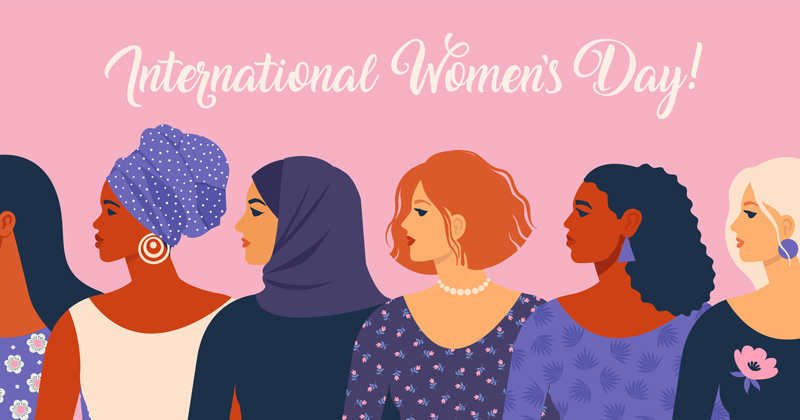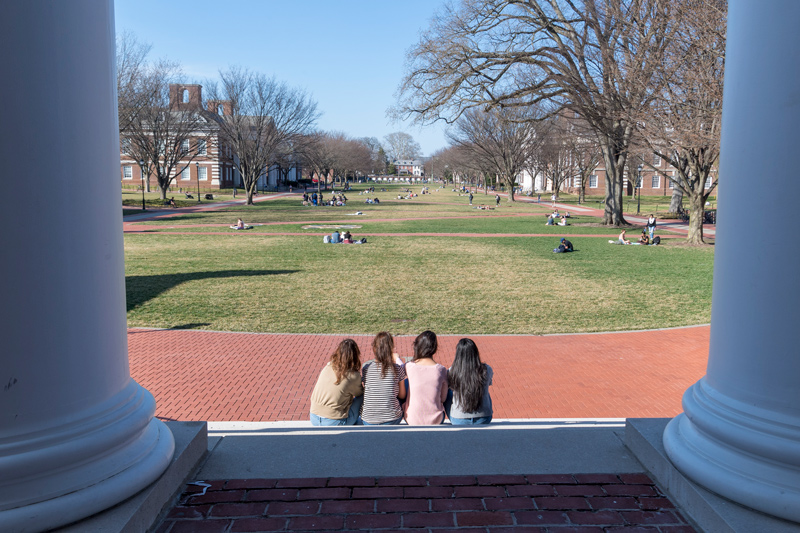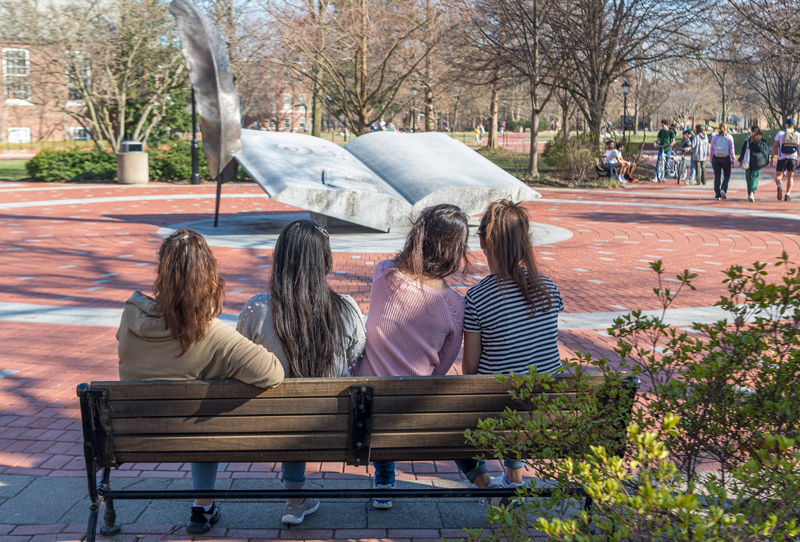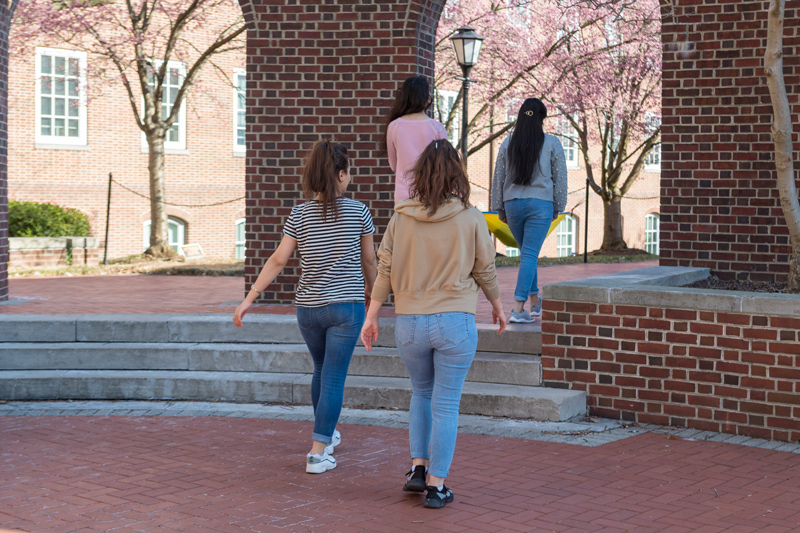


International Women’s Day
Illustration by iStock | Photos by Kathy F. Atkinson March 08, 2023
UD’s Women’s Leadership Initiative raises awareness of the remarkable Afghan women who have thrived since arriving on campus
Editor’s note: The University of Delaware uses the term “displaced,” not “refugee,” to describe the situation of these students because "refugee" has a specific legal definition that is not directly applicable to their situation as asylum seekers in the United States.
Faiza Saeedi said her parents felt so strongly about their children’s education that they moved from Ghazni in southeastern Afghanistan to the capital Kabul shortly after Saeedi was born to further their education.
Saeedi, who has four brothers and two sisters, said her family was supportive and treated boys and girls the same.
“They were always encouraging us,” she said.
When the Taliban came to Kabul, her family encouraged Saeedi to leave her home and country, because she wouldn’t have any rights under their regime. Her world was scrambled into a jumble of trauma, fear and opportunity.
She and 147 other students barely escaped on a military transport plane with the help of their former university, the Asian University for Women in Bangladesh, a story recounted in UDaily and UD Magazine. They persisted for days in trying to get through the gates at Kabul Airport, despite all the chaos and violence as crowds of others tried to do the same thing. After ending up in Wisconsin, Saeedi was among a smaller group brought to the University of Delaware.
The young women have not only thrived at UD but prompted the University to build a program to better serve displaced students.
In recognition of International Women’s Day on Wednesday, March 8, UD’s Women’s Leadership Initiative at the Alfred Lerner College of Business and Economics is highlighting the remarkable stories of these young women with a social media campaign. People can support these students, including helping cover their living expenses, on their HenFunder page.
For education, it depends where girls live
Most people don’t have to escape their home country to get at least some education. The world has made considerable progress toward equal education for girls and boys, according to a 2020 UNICEF report, which said in the previous two decades the number of girls out of school had been reduced by 79 million.
But that’s a little like saying humans have made significant progress toward colonizing Mars because humans invented space shuttles. It’s true by comparison to hot air balloons, but there are many and formidable challenges to go.

Educational parity is closer than humans having postal addresses on Mars. But still, of the world’s 796 million illiterate people in 2012, two thirds were women, according to UN Women, a branch of the United Nations working for gender equality. By 2022, the organization reported, “Girls’ learning outcomes have, on average, caught up to those of boys and in some cases surpassed them.” But girls in rural areas and impoverished families are lagging behind.
Overall, according to the 2022 report, almost 130 million girls around the world are still not enrolled in formal education, more than half of those in countries like Afghanistan facing crises.
UD’s Women’s Leadership Initiative at the Lerner College estimates it will take 132 years to reach global gender equity at this pace.
“It gets better all the time, but we have a lot of work to do,” said Amanda Bullough, an associate professor of management at Lerner and co-founder of the Women’s Leadership Initiative. Even in the U.S., she said, “we’ve been fighting the good fight, but it’s not perfect here either … I do think these things take entire generations to make a significant difference.”
Nowhere is the education gap more stark than in Afghanistan, where the rejuvenated Taliban recently banned education for all girls and women from secondary school on up. It’s the only country in the world with a policy this strict. Even Saudi Arabia and Qatar, often fiercely criticized for their treatment of women, called on the Taliban to moderate its stance.
Millions of girls had begun attending school under the U.S. occupation, with the result that twice as many as before learned to read, according to UNESCO. Nearly 33% of the country’s young women were enrolled in universities before the Taliban’s decision to ban university education for women in December.

The Taliban didn’t stop at education, instituting other restrictions like forcing women to wear clothing that covers everything but their eyes, admonishing them to stay home when possible and banning them from most jobs.
Given that an international coalition led by the U.S. military was not able to defeat the Taliban in 20 years of trying, it might seem like there’s little anyone can do. But UD is taking concrete action where it can, making a difference in the lives of more than a dozen young women. Bullough is part of a team working to help these women as they adjust to what can be a jarringly different life.
Transplanted
After months of intensive English language study and sheltered course work with UD’s English Language Institute, Saeedi and most of the rest of her now tight-knit group, 10 altogether, have matriculated to work toward a degree at the University.
Saieda Ali Zada, another one of the students, was studying engineering when the Taliban’s rise disrupted her plans. Knowing the new government was opposed to female education, she urgently wanted to find a way to continue her education at the Asian University for Women in Bangladesh. Despite being denied several times at the airport, she was determined to keep at it as long as there was any chance.
Winding up in the U.S. was initially very scary, Ali Zada said, because she had thought the plan was to study in Bangladesh. “I was thinking, ‘Oh my God, I get out of one situation, now I’m in another situation.’ ” But the people around them were kind and supportive, and that gave her hope and helped her calm down.
At UD, Ali Zada is studying biomedical engineering. She is not sure yet how she’ll use that degree, but she wants to solve human health issues.
Vice Provost Matt Kinservik, who helped arrange for the women to study here, marveled that in a year’s time they had mastered college-level English.
“I am amazed by how successful they’ve been,” he said. “I just think what they’ve been through and what they’re continuing to go through is so challenging.”
The chance to learn new things is Saeedi’s favorite part of being at UD, she said, along with the freedom she has. She is majoring in public policy with a minor in women and gender studies.
“Every day I am learning something new,” Saeedi said, and the professors and people around her are so nice. She added, “I feel safe.” If it weren’t for what her family and country are facing, she said, she would have a really good life here.
Saeedi gets distraught when she thinks about the family she left behind. “It is really hard,” she said, fighting back tears. Also, “It’s so difficult for us because we also have a different culture in Afghanistan. It’s difficult for us to adapt to a new culture.”

There are daily stabs — when Saeedi eats, she remembers her mother going without in Afghanistan’s struggling economy. When the semester started, she was getting her clothes and books ready, and she thought of her sister who can’t go to school.
It leaves her feeling terrible. “Sometimes I can’t focus on my studies, because I remember them,” Saeedi said. “Also, I really miss them.”
She is taking six classes, which she said is easy by comparison. If she has free time, Saeedi will think about her family, “so I make myself busy.”
Kinservik said he is inspired when he sees the students’ reaction to their journey and situation.
“All of the women, obviously, have experienced trauma,” Kinservik said. “They want to help their families, and they’re really driven to help change their country.”
As the Women’s Leadership Initiative has demonstrated through the years, leadership comes in different forms and in different ways.
“The women that are here are sort of leading the charge for everybody they left behind back home, and it puts them in a significant leadership role,” Bullough said, “which they weren’t necessarily (intentionally) embarking on.”
But, Kinservik added, “they’re also 20-year-olds, and our goal is to give them the space to be that, too.”
The group of students, Bullough said, has built a sisterhood since they came together.
“I like everything about UD,” Ali Zada said with a big smile. “The special part is that UD has a supportive environment for you. And it has many resources that you can use.”
She likes making new friends, trying new foods, and experiencing a new environment. Studying language has been difficult, Ali Zada said, and, like Saeedi, she finds it hard to be far from home. But her friends who came with her are doing well, Ali Zada said. “And I think we can get through this.”
Creating a system that can last
Bringing the Afghan women to campus came together quickly, Kinservik said. As the crisis in Afghanistan unfolded, he was amazed at how much interest in helping sprang up from the University community.
That cooperative effort could have a long-term impact. The University didn’t have a system set up to handle displaced students and their unique needs, but has come together to create one over the past months.
“What’s happened over the past year is we’ve discovered how many people on campus care about questions of forced migration and displacement,” Kinservik said.
Now, he said, they are working on a broader vision to keep the momentum going. In addition to developing a set of services for displaced students, this effort could include the creation of a field of study focusing on the causes of migration crises; the impacts on destination countries; and service learning opportunities among displaced people either in Delaware or overseas. It would mean an openness to helping the displaced whether they’re college students or not, Kinservik said.
The University is not a relief organization, but it does bring some “pretty remarkable strengths” in helping displaced people, Kinservik said, and “in the best possible way, we’re learning as much as the (students from Afghanistan) are.”
If the opportunity comes up in the future to help similar students, Kinservik said, “we know that we can be of assistance, and that we learned in the process.”
Trying to make a difference
Saeedi and Ali Zada both spoke of the hardships now faced by women in Afghanistan, which are very much on their minds.
With her degree in public policy, Saieedi said she hopes to specialize in education, empowering women and helping people deal with problems not only in Afghanistan, but around the world.
“I believe that education promotes stability in life, and we can understand the good and the bad,” Saeedi said. Basically, she wants to be the opposite of the Taliban through learning. “What the Taliban doesn’t know, I want to know that.”
And she has not given up on her country. All people hear in the U.S., she said, is the bad side of Afghanistan. When people meet her, they sometimes react with an “ ‘Oh, wow, you’re from Afghanistan,’ and that ‘wow’ is not a good wow,” she said. “And that makes me feel bad.”
But it’s a diverse country with brave men and women, Saeedi said, and beautiful places. She wants to be seen as an example of the good in the country, and said she wishes Afghanistan were safe so she could take her friends there to see it.
Although the Taliban has brought chaos — Saeedi said the frightening escape was the worst time in her life — someday, she hopes to be able to establish schools in Afghanistan so women and children can be educated once again.
Education gives the opportunity to change your life in a positive way, Ali Zada said, and you can impact others’ lives too.
“As people become more educated, and they understand human rights and income and economy and so on, then (poverty and inequality) get better,” Bullough said. “Education helps across the board.”
Contact Us
Have a UDaily story idea?
Contact us at ocm@udel.edu
Members of the press
Contact us at 302-831-NEWS or visit the Media Relations website

